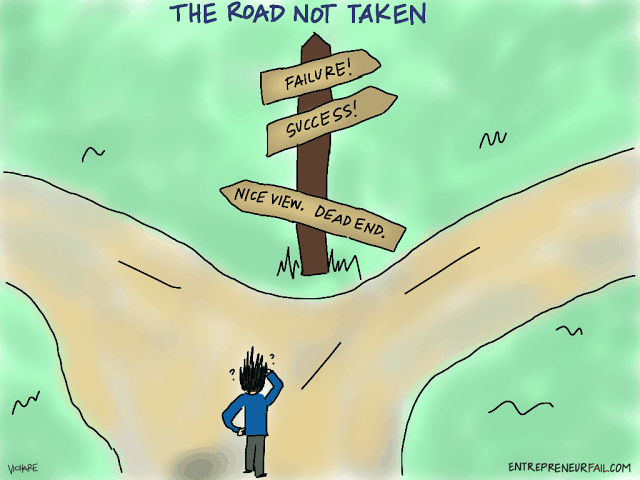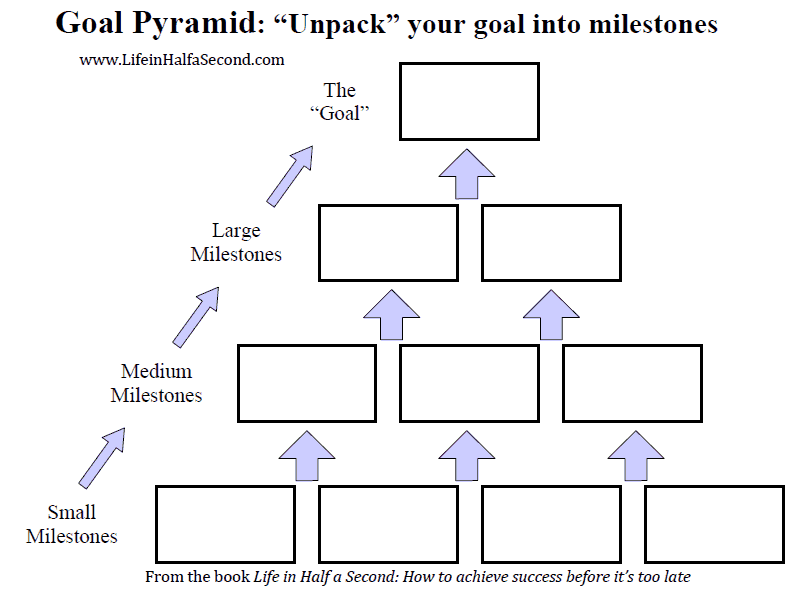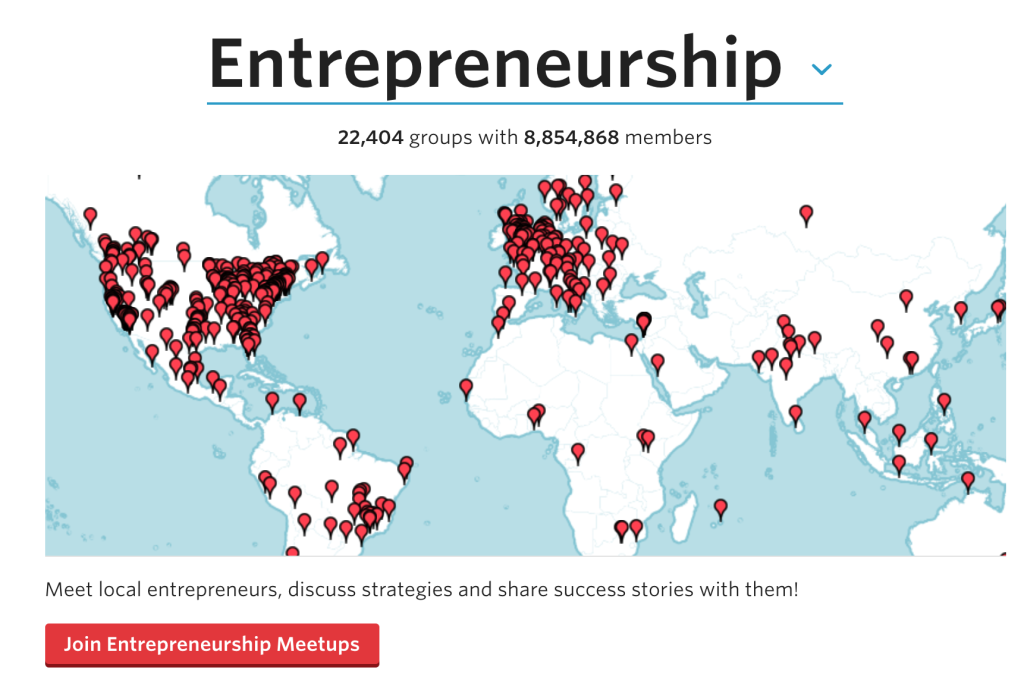This might be a dated reference but does anyone here remember those oldChoose Your Own Adventure books?
Those wacky books that weren’t really books but they sort of were? If not, the gist is that every now and then while reading, you’d be presented with two choices. Depending on your answer, you’d have to flip to page 36 or what-have-you to see how your decision affected the story. You remember those?
I distinctly remember reading one of those books when I was around 10 and, after choosing not to teleport to the alien planet, wound up at the ending where the protagonist ended up dying in a black hole. The cold comprehension of the endless vacuum of space aside, my 10-year-old self finally grasped the concept of there being consequences for my actions.
Get Your Checklist on The 3 Toughest Decisions When Getting Started, and How To Conquer Them!
The most difficult challenges we face often involve such a presentation of a potentially life-altering choice. Every now and then, life likes to throw us into situations where we see the path diverging in front of us.
It’s not too often that you’ll face such a clear-cut scenario, but every so often you’ll find yourself at such a crossroads.
As an entrepreneur, you’re going to experience these crossroads moments more often than most. Moments when you’ll be looking at two very clear choices. The choices cannot possibly coexist together, and you only have one chance to make a decision. And unlike a Choose Your Own Adventure book, you can’t just flip back to the start if you don’t like where you ended up.
So what do you do in those moments?
Well we’re going to help you answer that question. This is the first part of a series of Foundr articles I’m writing where I take the most common of these crossroads moments that each and every entrepreneur faces, and break them down so you’re better prepared to come to the right conclusion for you and your business.
#1: Am I an entrepreneur?
The first, and arguably the most life-changing, crossroads moment that every would be entrepreneur has to face at some point seems very simple. However, it’s the kind of decision that will absolutely dictate, at the very least, the next few years of your life if not the rest of it.
Making the decision to become an entrepreneur is not an easy one. Despite all the potential to grow as an entrepreneur, there are still huge pitfalls and risks. On the other hand, you can always do what the majority of the population does and play it safe, if you’re sure you’re going to enjoy the view.
According to the latest report by the Global Entrepreneurship Monitor, there has never been a better time to become an entrepreneur than right now.
Quite simply, the entry points for becoming an entrepreneur are now more accessible than ever. A mixture of technological, social, cultural, and market forces have come together to create an unprecedented era in which involvement in startups and entrepreneurship are at an all-time high.
So it’s pretty safe to say that, more than ever, making the decision to become an entrepreneur is easier than ever. After all, it’s hard to say no to the multitude of positive reasons to start your own business today.
No other career path can really let you be as creative and exert full responsibility over your own destiny and lifestyle. However the question isn’t whether or not you want to become an entrepreneur, it’s whether or not you have what it takes to be one.
Let’s do a quick breakdown of the entrepreneurial personality.
According to Bill J. Bonnstetter of Target Training International, there are five distinct skills that define the entrepreneurial mindset. Stripping away the individualized technical skills, you’re left with: persuasion, leadership, personal accountability, goal orientation and interpersonal skills.
Another study at the University of Virginia found that a key factor behind what makes an entrepreneur “entrepreneurial” is their capacity for effectual reasoning. Effectual reasoning essentially means the ability to work with any given set of means and allow goals to naturally occur, as opposed to working towards a defined goal with a set strategy.
Personally, I subscribe to the Steve Mehr and Gary Vaynerchuk philosophy of entrepreneurship, where it’s all about the hustle. That if you’re simply willing to work harder and sacrifice more than the rest of the world to build something of your own, then you’re an entrepreneur.
I’m probably equally talented to a lot of people out there. I think I have a lot of talent, but I think a lot of people do. What I’m completely convinced of is that I don’t think people can outwork me. – Gary Vaynerchuk
The reality is that entrepreneurship isn’t a job, it’s a lifestyle with it’s own hidden pitfalls and traps that many people may not immediately realize. What they don’t tell you is that the journey to becoming a successful entrepreneur is filled with a litany of awkward conversations, sleepless nights, and burnt out days. You’re going to have to dig deep and find the motivation to keep on going no matter what. As our own Foundr and CEO Nathan Chan put it when talking about making the change to a full-time entrepreneur himself:
I think one the biggest things you need to be is hungry. If you’re not hungry, if you’re just doing it for fun, if you’re just doing it because you want to see what happens, if you don’t want it bad enough, if you’re doing it half-assed, if you’re not really trying to give it 100%, then you’re not going to make it.
I think you have to want it so badly, you have to have so much drive and determination. And you have to be prepared to get up at 5am in the morning when you’re super tired and you’ve gone to bed at 1 a.m. You have to be prepared to write a whole ton of emails and be rejected and have people not reply back to you.
That’s the kind of stuff you have to be prepared to do, because you’re going to get a lot of that.
There’s going to be a lot of people telling you that it’s not going to work, there’s going to be a lot of people that aren’t going to get back to you, there’s going to be a lot of people who won’t try to help you, there’s going to be a lot of people who want to bring you down, there’s going to be a lot of people who think you’re an idiot.
You’re going to want it so badly you don’t care about what people think, you’re not afraid to fail. You’re super hungry.
So in order to overcome your first crossroads decision, you have to consider whether you have these qualities. And if not, consider whether you’re willing to invest time into developing them—if you have what it takes to hustle and grind your way all the way to the top.
Get Your Checklist on The 3 Toughest Decisions When Getting Started, and How To Conquer Them!
You’re already on the right track by being a part of the Foundr community and reading this article, but this is a decision that only 14% of US adults will get past. So really think about whether or not you have what it takes to be an entrepreneur before reading on.
#2: Do I do this full time or part time?
Now that you’ve decided to become an entrepreneur and start building a business, you have to figure out your next move. That means deciding whether or not you want to work full time on your startup, or keep it as a side hustle.
Let’s be absolutely clear here, the more time you spend on your startup, the higher your chance of success is.
The advantage of being able to work on your startup full time is that you’re able to focus on one thing at a time, and that is absolutely priceless. Your ability to sink in more hours and sweat equity into your business means that you’re able to stay ahead of the curve.
Investors will take it as a sign of confidence that you believe in your startup so much that you’re willing to risk working on it full time. Employees are, generally speaking, more likely to work for a full-time CEO over a part-time one. If you want to attract top talent to your startup, you have to show that, out of everyone, the person most dedicated and invested in your startup is you.
By working on your startup full time, you’re less likely to be burnt out, less likely to view your business as a hobby, and much more likely to increase your chances of success.
So on one level, this is a no-brainer—if you can afford to work on your business full time then you absolutely should.
Every minute spent working on your startup is accelerating the pace of your business’s growth, and that’s a winning proposition in the long run. – Justin Toben, founder and president of DDG Inc.
But before you go and call your boss and tell them what you really think of them and how you’re totally not sorry about the incident at last year’s Christmas party, I want you to pause and take notice of the crucial words “if you can afford to.”
Although while you have them on the phone, you probably should apologize for what happened at the “Fourth of Ja-luau” event.
Of course, in an ideal world you’d have investors itching to give you money or a rich uncle who’s fond of you, and you’d be able to commit all your time and energy into your startup. Unfortunately, the world is rarely ideal.
Chances are you’re part of the 80% majority of entrepreneurs who are starting a business while still working a regular job.
Which completely makes sense. Unless you have the means to live without a salary for at least a year then you’re going to need a steady paycheck of some sort. That’s not even factoring in things like funding the startup itself, or taking care of your basic necessities.
While it’s not perfect, it’s still well within reason to build a successful startup while only working on it part-time in the beginning. Foundr’s own founder and CEO Nathan Chan started Foundr on the side while working a day job for over a year before completely dedicating himself to it.
Running a startup on the side means you can hedge your bets in terms of income. Having a reliable source of income means you’re not required to make as many risky decisions. In exchange for speed and agility, you have greater product control, a shallower learning curve, and a far smaller capacity for risk. So you’re less likely to end up with you back up against the wall in regards to finances at least.
The two biggest risks associated with part-time entrepreneurship are a higher chance of falling behind the rest of the competition and a much higher chance of burnout.
If you’re serious about running a successful startup part time, you’re going to have to get comfortable with the idea of working nights, weekends, and holidays. Any time you have off from your day job will almost inevitably be invested into building your startup.
Working in transit, back and forth on the train, working weekends, working Christmases, working Easter, so on top of doing a 40-hour job, I was probably doing another 60 hours on the app a week. – Chris Strode, founder and CTO of Invoice2go
Make sure to maintain a healthy work-life balance, or at least a semblance of one. Burnout can not only kill your startup, but it can seriously affect your work performance at your day job as well. So make sure to take a moment every now and then to decompress and relax.
If you’re ready to log in the necessary hours to start your company on the side, we recommend you follow these rules:
- It’s all in the preparation. Make sure you do a ton of research to stay ahead of the curve and let your family and friends know that they’re probably not going to be seeing you around that often.
- Save, save, save. You either want to make enough money from your startup to eventually replace your current income, or save enough money to live comfortably for a year without a salary when it’s time to leave the day job.
- Hit those targets. Create a goal pyramid and create an aggressive timeline based on it, making sure you’re constantly hitting those milestones no matter what.
- A little goes a long way. Whether it’s half an hour or several, make sure you work on your startup at least once a day. Start managing your time better and do whatever it takes to push the needle forward everyday.
Remember that ultimately, the goal is to be able to quit your regular job so you can go from a part-time entrepreneur to a full-time one. When the time comes it can be a scary step to take, but you’ll be all the better for it when you finally cross that bridge.
#3: Do I want people to know I’m an entrepreneur?
This one might be easy for some, but it’s actually a crossroads decision that many entrepreneurs don’t realize will be difficult until they’re just about to cross it.
One of the most common challenges you’ll face as an entrepreneur is the fact that the majority of the population, including your friends and family, just won’t get it. Whether it’s coming from a place of love or malice, most people will only see the much higher potential for failure associated with entrepreneurship.
You can’t blame them when you take a look at frightening statistics like the one presented by Shkar Ghosh, a senior lecturer at Harvard, that 95% of venture-backed startups end in failure.
But why is this a crossroads decision? After all, your family doesn’t run your business, you don’t have to listen to advice from your friends, so why is this so difficult?
In short, humans naturally crave acceptance and support from our peers.
Humans are naturally social creatures. We like being in groups where we feel admired and respected. That’s why the number one thing people fear more than death is embarrassment, to be somehow separate or different from the group. Jerry Seinfeld was totally right when he said that the number one thing that people fear is speaking in public.
And what’s the deal with angel investors amiright?
It’s not something that you just grow out of once you get out of high school. Our natural fear of failure doesn’t even compare to our fear of failing publicly.
Think about anytime you didn’t want your parents to know about a bad grade you got on a test, or how desperately you tried to figure out how to untag yourself from an unflattering photo on Facebook. Because sometimes failure, and just about any other emotion, just doesn’t feel real until somebody else sees.
Telling people that you’re an entrepreneur is opening yourself up to the expectations of others and inviting their opinions, expectations, and criticism, whether you like it or not.
While it would be great to have a super supportive network around you as an entrepreneur, unfortunately the reality is that it’s not an option for everyone.
When I graduated high school and I told my family I was going to start a business, my grandparents, my uncles, they all came in one at a time and told me ‘you’re going to be a loser, you’re going to end up on the street, you’re insane, you can never make it without an education.’ Basically I got a sense that these people don’t respect me at all because of the decision I made. – Steve Mehr.
Sometimes it’s not so much a fear of failure but a fear of not living up to everyone else’s expectations. That extra dimension of pressure can prove to be too much for some and can severely affect not only your startup vision but your relationship with others as well.
Which is why so many entrepreneurs, especially part-time entrepreneurs, choose not to tell their friends and family about their early endeavors.
My toughest decision was not informing my parents and friends that I had ventured out on my own. I did this for two reasons. I didn’t want them to be worried, and I didn’t want to satisfy external expectations. Building something of your own takes time and for me, I needed the space to figure things out. In doing so, I wasn’t under pressure to prematurely paint a picture of success. – William Channer, founder and host of Dorm Room Tycoon.
Not having that extra stress of having to live up to expectations can be incredibly liberating as an entrepreneur. It frees you from having to compromise your creativity or imagination because of scrutiny from people around you.
At the end of the day though, you can’t remain a secret entrepreneur forever.
The reality is that you’re eventually going to have to learn to develop a really thick skin. You will deal with rejection and negativity everywhere you go, but you shouldn’t hide from it. Learn to take it on the chin and have the worst of it roll off your back.
Closing yourself off generally doesn’t make you a better entrepreneur in the long run. You’re not only closing yourself to all the potentially negative outcomes, but all the positive ones as well.
Like I said earlier, humans are naturally social creatures, you are going to need a support network around you to help you get through your entrepreneurial journey. If your current social network doesn’t understand, then do what Steve Mehr did and use it as fuel for your fire. Prove them wrong or just simply find better friends.
Entrepreneurship is at an all-time high right now, with 70% of adults across 60 different economies holding entrepreneurs to a “high status” in their respective societies, 21% planning on starting a business within the next three years, and 66% viewing entrepreneurship to be a viable career path. You’ll definitely be able to find yourself a great support network of like-minded individuals.
Start attending your local entrepreneurial meetups, or start going on the right forums and start connecting with other entrepreneurs.
To really overcome this crossroads decision, be sure to talk openly with your family about it, especially if you’re an older entrepreneur with a family depending on you. Starting a business doesn’t only affect you, so your family and friends have a right to worry about you after all. Be honest, let them know why you’re making this decision and even better, actually pitch them your business as if they were a VC or an investor.
Don’t just argue with them about why they should support you, show them how and why it’s going to work. Make them feel like they’re a part of your journey and your success and not just spectators to your failures. Plus it’s a great exercise in learning how to pitch. And who knows, you might even bring them over to your side.
That will be a huge benefit, since having a good work-life balance means having the right people to welcome you back after you finish work.
Conclusion
The entrepreneurial journey can be a very cold and windy one, with lots of twists and turns and different forks in the road. Each one feels like it’s just as, if not more, important than the last.
Get Your Checklist on The 3 Toughest Decisions When Getting Started, and How To Conquer Them!
But don’t worry, Foundr is here to help! As we discussed above, people are social animals who need support from their peers, and that’s a big part of why we’re here. Sometimes just knowing that other people have faced or are facing similar tough decisions is all it takes to help you wrap your head around the solution or find motivation.
As our series continues, we’ll provide our Foundr Family an in-depth guide and a forum to share and discuss these tough decisions along the way. So be sure to check out the next article in this series of “Entrepreneurial Crossroads” where I’ll be breaking down even more of these pivotal decisions and helping guide you to the right choice for you.
We also want you to join in the discussion! Let us know in the comments below what your toughest decision as an entrepreneur was, why it was so difficult, and how you eventually got past it.

























